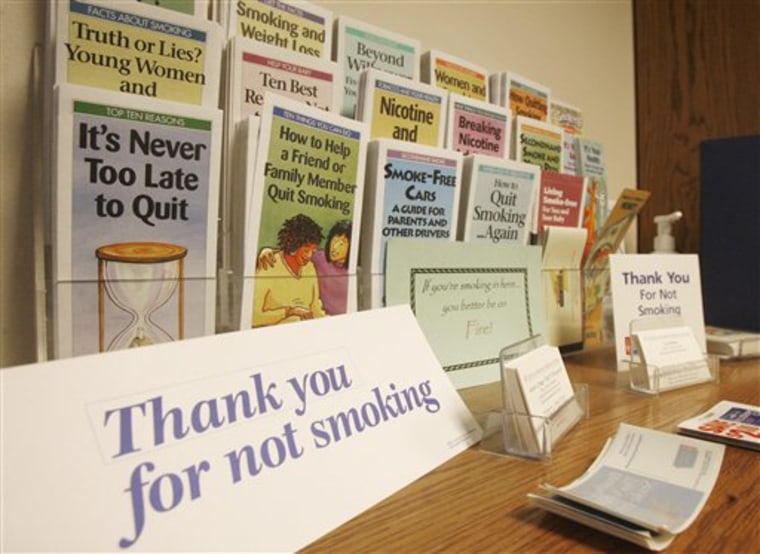In the half-century since the surgeon general issued his culture-changing report linking smoking to lung cancer, the tobacco industry has had little trouble defeating efforts to regulate cigarettes and other products. That could change this year.
The Senate is debating legislation that would give the Food and Drug Administration authority to control ingredients going into tobacco products, restrict marketing and ads aimed at young people, and ban words such as "light" or "low tar" that may mislead people about the health risks of smoking.
The legislation, said Matthew Myers, president of Campaign for Tobacco-Free Kids, is "by far the strongest bill to reduce tobacco use that this nation has ever seriously considered."
Myers and other supporters, such as the American Heart Association and the American Lung Association, say the stars may finally be aligned for decisive action on the tobacco issue. The House passed a similar bill by a wide margin and President Barack Obama supports it. It also commands a majority in the Senate, although tobacco-state senators say they won't give up without a filibuster fight.
Previous restriction efforts limited
Federal dependence on the tobacco industry goes back at least to the post-Civil War era, when a tobacco tax became an important revenue source. Franklin Roosevelt made tobacco a protected crop and cigarettes were included in the C-rations of World War II soldiers, introducing smoking to millions of young men.
The 1964 surgeon general's report made official what many people already suspected — that smoking is deadly — but the next year Congress, under pressure from the industry and tobacco-state legislators, succeeded in watering down new health warning labels on cigarette packs.

In 1969, Congress did ban cigarette ads on television and radio but at the same time ended free anti-smoking ads on the airways and restricted the authority of the Federal Trade Commission to require stronger warning labels.
Myers said that the first time Congress acted in opposition to the tobacco industry was in 1984, when it passed legislation to strengthen warning labels.
In the late 1980s and again in 1990, lawmakers agreed to ban smoking on commercial air flights. "It was such a radical change," said Sen. Frank Lautenberg, D-N.J., of that initial effort to prohibit smoking in a public area. Since then, he said, "we've had to creep and crawl every step of the way."
But popular attitudes toward smoking have been changing. Cigarette smoking has dropped from 51 percent of men and one-third of women in 1965 to 24 percent of men and 18 percent of women in 2006.
States have also taken the lead in banning smoking from public areas. Nancy Brown, head of the American Heart Association, noted that North Carolina, the country's biggest tobacco producer, recently passed one of the nation's toughest clean indoor air acts.
The regulation battle takes a turn
One turning point came in 1994 when tobacco company CEOs, at a hearing held by anti-smoking champion Rep. Henry Waxman, D-Calif., one after another denied that smoking was addictive.
With that, said Brown, "people realized that the tobacco industry will stop at nothing to deceive Americans."
In 1996, the FDA sought to assert jurisdiction over tobacco products, beginning a legal battle that continues to this day.

The next year, Sen. John McCain, R-Ariz., fell three votes short of overcoming a filibuster of legislation approving a massive settlement deal between major tobacco companies and the states and including FDA authority.
With that defeat, a more narrow deal was reached the next year under which the companies agreed to pay the states $206 billion for health care costs and anti-smoking campaigns.
The Supreme Court in a 5-4 vote in 2000 ruled that the FDA did not have the authority under current law to regulate tobacco. Since then the House and Senate have both approved bills giving legal status to the FDA but have not been able to agree on a common bill.
FDA authority was stripped out of the final version of a 2004 act signed by President George W. Bush that ended a Depression-era price support system for tobacco growers, replacing it with a buyout program that provided an incentive for many tobacco farmers to switch to other crops.
The decrease in tobacco farmers and workers in the tobacco industry is one reason the FDA bill is meeting less resistance from tobacco-state lawmakers this time around. Another is the realization that reducing the costs of tobacco-related health problems, estimated at nearly $100 billion a year, is essential to the drive to overhaul the nation's health care system.
Still, old habits die hard. It was only last year that Lautenberg persuaded the Senate to stop selling tobacco products at its shops and close all of its smoking rooms.
